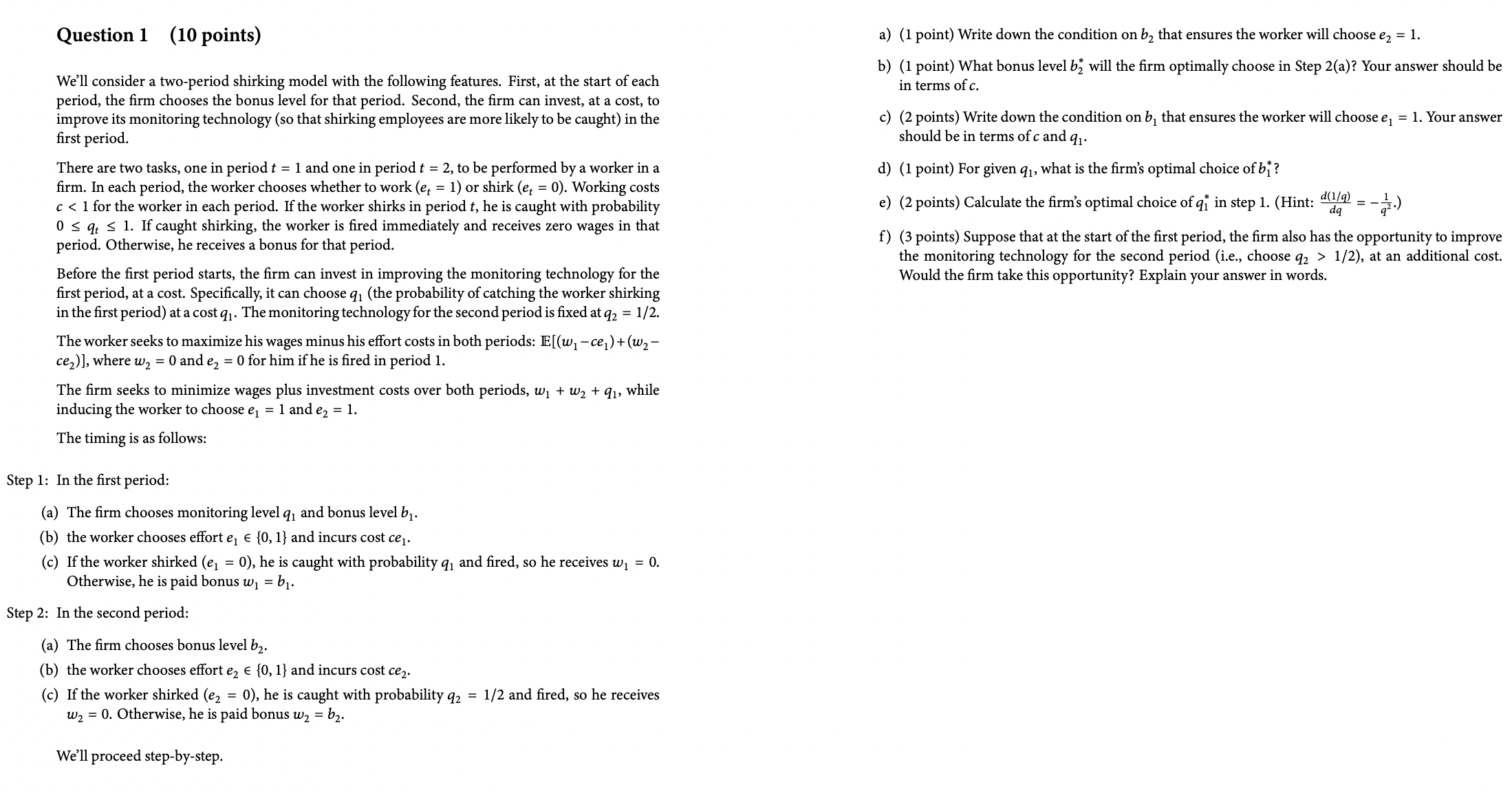Answered step by step
Verified Expert Solution
Question
1 Approved Answer
Question 1 (10 points) We'll consider a two-period shirking model with the following features. First, at the start of each period, the firm chooses

Question 1 (10 points) We'll consider a two-period shirking model with the following features. First, at the start of each period, the firm chooses the bonus level for that period. Second, the firm can invest, at a cost, to improve its monitoring technology (so that shirking employees are more likely to be caught) in the first period. There are two tasks, one in period t = 1 and one in period t = 2, to be performed by a worker in a firm. In each period, the worker chooses whether to work (e = 1) or shirk (e = 0). Working costs c < 1 for the worker in each period. If the worker shirks in period t, he is caught with probability 0 q1. If caught shirking, the worker is fired immediately and receives zero wages in that period. Otherwise, he receives a bonus for that period. Before the first period starts, the firm can invest in improving the monitoring technology for the first period, at a cost. Specifically, it can choose q (the probability of catching the worker shirking in the first period) at a cost q. The monitoring technology for the second period is fixed at 92 = 1/2. The worker seeks to maximize his wages minus his effort costs in both periods: E[(w-ce)+(w- ce2)], where w = 0 and e2 = 0 for him if he is fired in period 1. The firm seeks to minimize wages plus investment costs over both periods, w + W + 91, while inducing the worker to choose e = 1 and e = 1. The timing is as follows: Step 1: In the first period: (a) The firm chooses monitoring level q and bonus level b. (b) the worker chooses effort = {0, 1} and incurs cost ce. (c) If the worker shirked (e = 0), he is caught with probability q and fired, so he receives w = 0. Otherwise, he is paid bonus w = b Step 2: In the second period: (a) The firm chooses bonus level b. (b) the worker chooses effort 2 {0, 1} and incurs cost ce. (c) If the worker shirked (e2 = 0), he is caught with probability q = 1/2 and fired, so he receives w2 = 0. Otherwise, he is paid bonus w = b. We'll proceed step-by-step. a) (1 point) Write down the condition on b that ensures the worker will choose e = 1. b) (1 point) What bonus level by will the firm optimally choose in Step 2(a)? Your answer should be in terms of c. c) (2 points) Write down the condition on b that ensures the worker will choose e = 1. Your answer should be in terms of c and q. d) (1 point) For given q, what is the firm's optimal choice of b? e) (2 points) Calculate the firm's optimal choice of 91 in step 1. (Hint: d(1/9) = dq f) (3 points) Suppose that at the start of the first period, the firm also has the opportunity to improve the monitoring technology for the second period (i.e., choose 92 > 1/2), at an additional cost. Would the firm take this opportunity? Explain your answer in words.
Step by Step Solution
There are 3 Steps involved in it
Step: 1

Get Instant Access to Expert-Tailored Solutions
See step-by-step solutions with expert insights and AI powered tools for academic success
Step: 2

Step: 3

Ace Your Homework with AI
Get the answers you need in no time with our AI-driven, step-by-step assistance
Get Started


